Jump to section
- 1.1 Key purpose of the Accountability Agreement
- 1.2 The impact of SGS College on the regions we serve
- 1.3 Strategic Planning and our priorities
- 1.4 The College's Curriculum Planning Cycle and Skills Strategy
- 2.1 Our campuses
- 2.2 The Economy of our region
- 3.1 Approach to developing the Annual Accountability Statement
- 4.1 Local Skills Improvement Plans - Gloucestershire and the West of England
- 4.2 SGS Employer Partnership Panels
- 4.3 RCU Provision Gap Analysis
- 4.4 National Skills Priorities
- 4.5 Self-Assessment and Quality Review Process
- 4.6 Data analysis - our key drivers
- 4.7 Our Accountability Targets
1.1 Key purpose of the Accountability Agreement
The aim of our annual Accountability Agreement is to provide a succinct and focussed overview of why our provision is important and the contribution the College makes to the communities and stakeholders we serve.
Set against the context of our Strategic Plan, this document outlines any changes since the approval of that plan, and how the new statutory duty to review our provision annually links to our College business cycle, our Skills Strategy and the overall impact on our curriculum development.
1.2 The impact of SGS College on the regions we serve
As a regional College, delivering to nearly 10,000 learners annually across South Gloucestershire, Gloucestershire and Bristol, SGS has immense experience of working with a range of public bodies including the West of England Mayoral Combined Authority, local authorities, district councils, local enterprise partnerships and education providers at both further and higher education levels in addition to our sponsored Multi-Academy Trust (SGSAT) which was established in direct response to our local authority need.
As a sub-regional College, we will continue to play a critical role in advancing an inclusive and prosperous economy for the communities that we serve. Building on our extensive skills expertise and curriculum knowledge, we will work collaboratively with others to draw on a wealth of knowledge and experience in order to continue to provide the skills that the employers we serve need in a rapidly changing world.
We have an excellent track record of working collaboratively with stakeholders in order to collectively benefit and contribute to our communities, however, there is more we need to do to ensure we provide a skilled regional workforce for the future and continually develop our curriculum in response to emerging technologies and careers. We are confident our targets within this Accountability Agreement will continue to contribute to regional prosperity
As a College we have benefitted from being part of the national Department for Education Skills Development pilot, plus we have led on the £2.7m Strategic Development Fund project for Gloucestershire. We excel at working with other educational partners to ensure the regional offer enables economic growth and prosperity. We also deliver Adult Education Budget (AEB) funded provision and other programmes funded by the Combined Authority.
As outlined within both our Strategic Plan and Skills Strategy, working in collaboration with stakeholders is at the heart of all we do and the impact that we make is evidenced in our annual 'Meeting Local Needs' report.
1.3 Strategic Planning and our priorities
Our Strategic Plan was updated and approved in January 2023 and sets the College’s direction of travel towards 2030 and delivering the Government’s global goals, as well as regional priorities.
As a regional College, we will respond to the expected demographic growth in the north of Bristol and the capacity issues this raises at our Filton and WISE campuses, whilst looking to innovate and diversify at our Stroud Campus, in order to increase capacity and turnover.
Since approving our Strategic Plan , the College has since completed and opened our new Apprenticeship Construction Centre at SGS Horizon 38, supporting over 500 apprentices annually.
We have also received approval from the ESFA for direct recruitment of 14-16 year olds to our new SGS Create facility at the Stroud Campus and we have decided to pause pursuing higher education accommodation at our WISE Campus as we reconsider our Higher Education Strategy, in order to focus on a more regional higher technical offer rather than competing with our local universities in the national market.
Working in partnership is vital to us and we will continue to work collaboratively with employers, communities, civic leaders and other providers in order to strategically plan skills provision and regional skills capital that enables sustained growth and investment in new technologies and markets whilst reducing duplication and promoting accessibility and specialisms where required.
Our success will be defined by responding to the priorities within the regional Employment and Skills Plan and the Local Skills Improvement Plans, supporting learners into positive destinations and sustained employment, the growth of our employer partnerships that enable enhanced work experience, apprenticeships and the co-design and delivery of our curriculum.
We have four main strategic targets:
- To be recognised as an outstanding College by enhancing the quality of the experience we provide for all learners - Our Students.
- To ensure we invest and develop our staff to support our Plan - Our Staff.
- To be visionary and innovative in providing educational opportunities by anticipating and meeting demand through our responsive partnerships with stakeholders - Our Stakeholders & Communities
- To provide a sustainable educational and training environment which is equipped for the delivery of high-quality learning - Our Finance & Resources
1.4 The College's Curriculum Planning Cycle and Skills Strategy
The aim of our annual Accountability Agreement is to provide a succinct and focussed overview of why our provision is important and the contribution the College makes to the communities and stakeholders we serve.
Set against the context of our Strategic Plan, this document outlines any changes since the approval of that plan, and how the new statutory duty to review our provision annually links to our College business cycle, our Skills Strategy and the overall impact on our curriculum development.
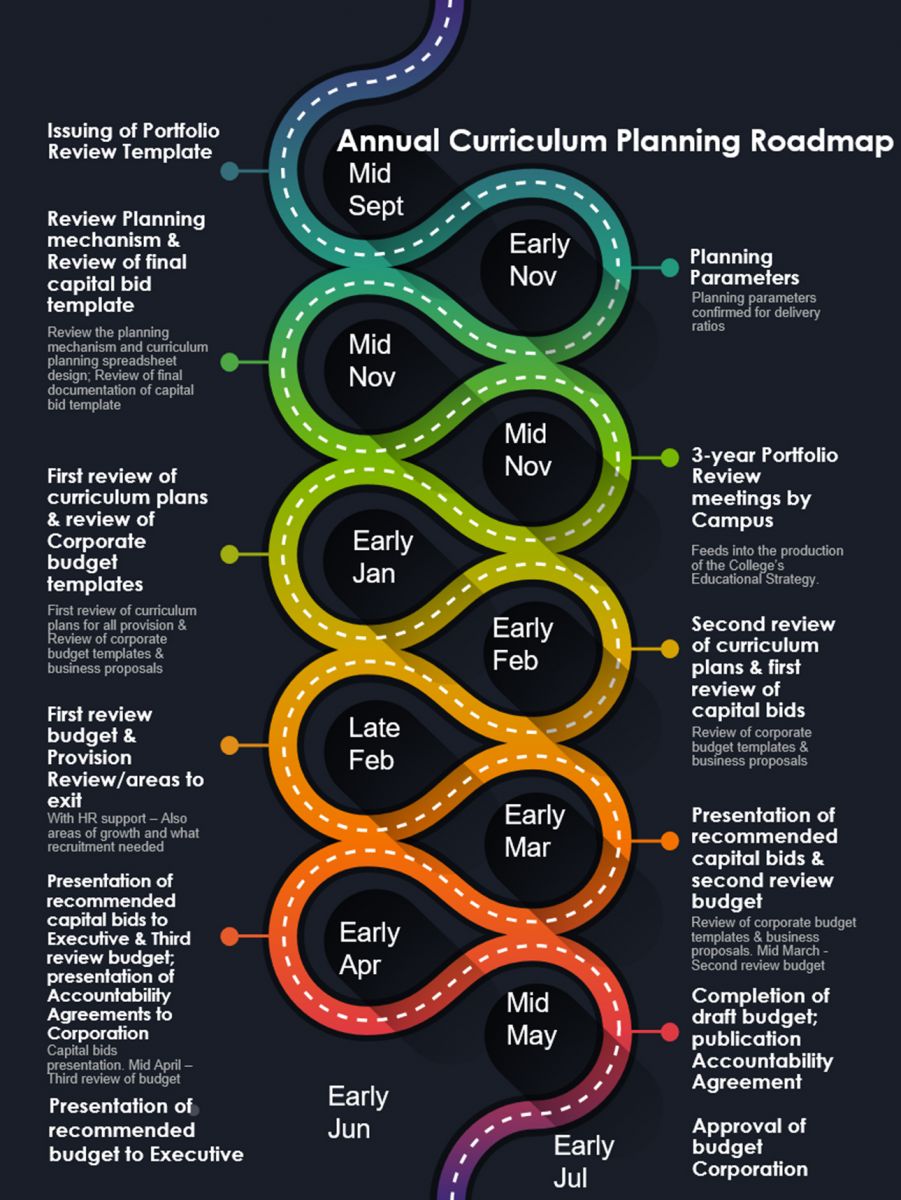
2.1 Our campuses
SGS College is a regional college with three main campuses. Within South Gloucestershire and Bristol, our main sites are:
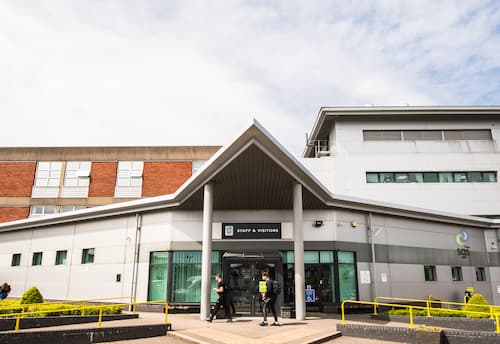
Filton Campus: Nearly 3000 16-18 learners, adults and apprentices studying vocational and academic provision, with a significant concentration of level 1/ 2 learners studying construction. The majority of learners travel to site by public transport from the surrounding catchment areas of Thornbury, Yate, Filton, Newport and a considerable proportion of North Bristol residents. This Campus also supports adult learners in Financial and Professional Services and a high volume of ESOL learners.
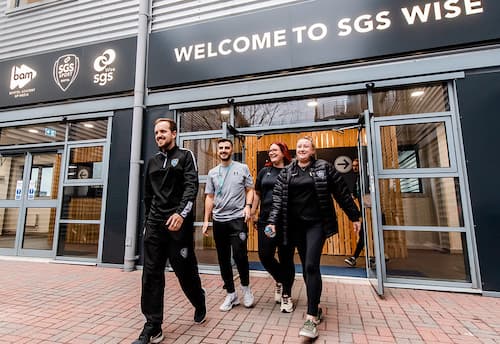
WISE Campus: Over 1000 learners studying at a purpose-built state-of-the-art Sport and Visual/Creative/Media and the Arts Centre. 500 adults are also engaged in Sport and Well-being programmes. Within walking distance of Parkway and Filton Abbeywood stations, this Campus attracts learners from further afield due to the proximity to the main Birmingham-Plymouth rail route.
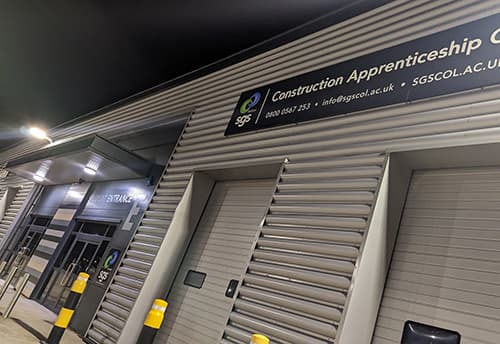
SGS Horizon: Opened in 2023, this professional environment supports over 500 construction apprentices annually from across the West of England and we have ambition to expand our provision into adult construction courses.

Queens Road: Within the Centre of Bristol, this rented facility adjoining the Royal West of England Academy, provides an art school facility for 150 students transitioning onto University programmes. In addition, over 250 adult learners are supported with Art for Well-being provision.
Within Gloucestershire we have two campuses:
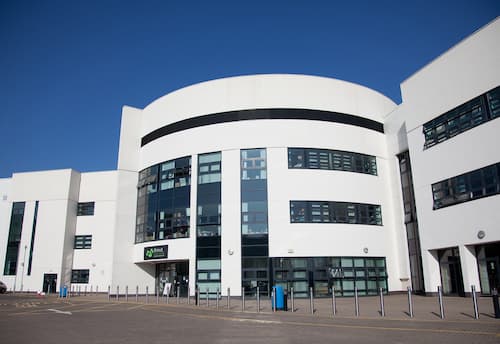
Stroud Campus: Supporting 750 vocational learners from across the surrounding town and rural valleys of Stroud with a significant focus on Sustainability, Creativity and Wellbeing programmes. This facility will also be the base for SGS Create, opening in September 2023, supporting direct entry for 14-16 learners with a specific focus on those with social, emotional and mental health needs.
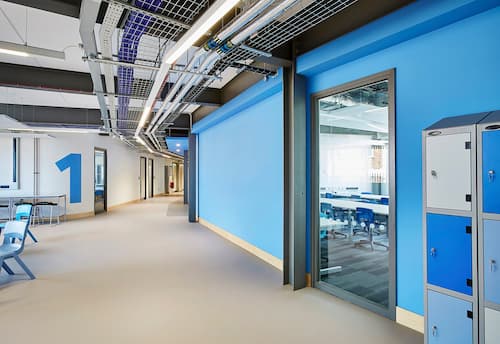
SGS Berkeley: The home of the Gloucestershire Science and Technology Park and the College’s Sponsored University Technical College. This Campus will be our base for our new Low Carbon Training Centre for adults (opening Autumn 2023) In addition, the College supports over 450 learners with Special Educational Needs across all of our sites and this is a growing area of our work.
Community Venues: We also work in community centres and libraries, delivering a range of adult provision with a focus on literacy, numeracy, ESOL, Art and Well-being.
2.2 The Economy of our region
Our region is viewed as Gloucestershire in the North, and South Gloucestershire within the West of England area.
Gloucestershire has a prosperous and resilient economy set within a highly attractive natural environment, which offers a high standard of living for the majority of local residents, however there are pockets of deprivation and the county has 12 lower super output areas of multiple deprivation.
The county is predominantly rural with two urban centres that serve as the main business and commercial heartland. The urban settlements are complemented by vibrant market towns that act as valuable employment hubs and key providers of services.
The development of the county has been strongly influenced by connectivity to the Midlands and South West via the M5 corridor and to London and the South East via the M4 corridor.
The Local Skills Dashboard presents a very positive picture in terms of the future opportunities for Gloucestershire. 8% projected growth outlines the potential for the College to support this growth, however the College needs to contribute with an improvement in apprenticeship achievements which has seen a significant decline in line with national trends since the Pandemic.
Overview of local landscape in West of England and North Somerset LSIP
Change metrics are measured against the same period in the previous year. NB non-zero axes.
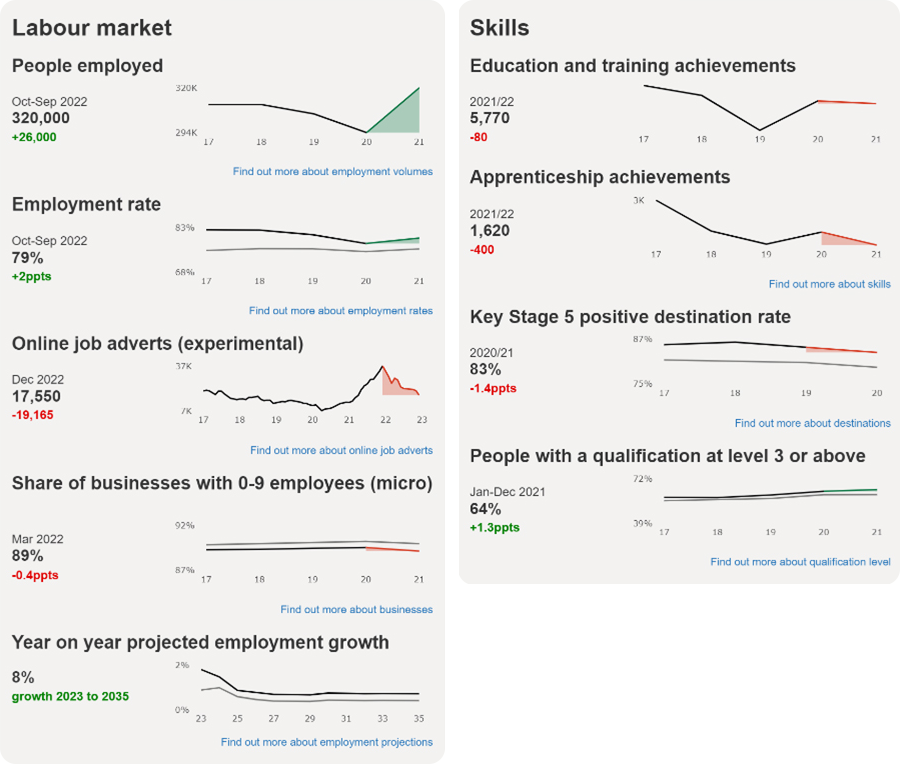
South Gloucestershire is part of the West of England and West of England LEP area. Despite some areas of significant poverty, especially around the College’s Filton Campus, South Gloucestershire is an area of economic prosperity with one of the highest levels of employment in the country and is regarded as having one of the highest qualities of life in the United Kingdom, however this is not reflective of the learners that we recruit, especially at the Filton Campus.
Local residents value their quality of life and the local environment with its mix of urban and rural centres. South Gloucestershire is a centre of excellence for high-tech manufacturing industries such as aerospace and advanced engineering.
Overview of local landscape in Gloucestershire LEP
Change metrics are measured against the same period in the previous year. NB non-zero axes.
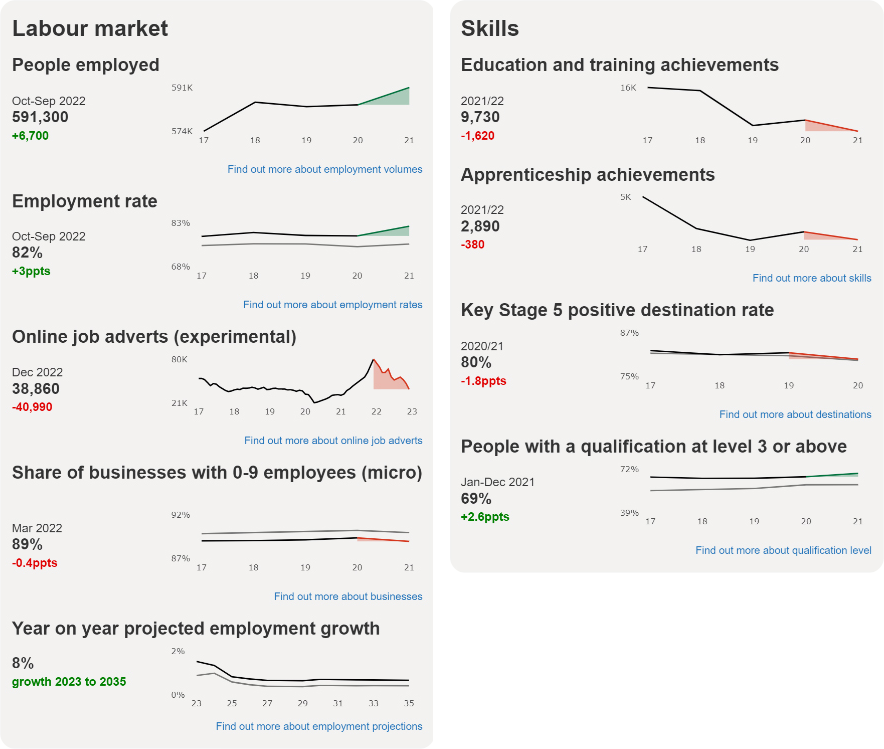
3.1 Approach to developing the Annual Accountability Statement
Our Accountability Agreement is a key output within our annual Skills cycle and augments both qualitative and quantitative data in the form of the following key sources:
- The outcomes from both the West of England and Gloucestershire Local Skills Improvement Plans (LSIPs) and the West of England regional Employment and Skills Plan
- Feedback directly from employers from our termly Employer Partnership Panels across all curriculum areas
- Our own commissioned Gap Analysis of provision across the West of England and Gloucestershire
- Our own quality review processes and annual self-assessment report and National skills policy guidance
The College has worked collaboratively with the other colleges within the West of England on the production of our collective Accountability Agreements.
Having worked collectively through existing close working relationships, forged through joint skills planning formerly with the Local Enterprise Partnership and latterly with the West of England Combined Authority (WECA) and it's Skills Advisory Panel (SAP), all further education partners have shared their priorities within their individual Accountability Agreements to ensure that collectively we are addressing known skills gaps, avoiding duplication, and supporting the targets set within both the West of England Combined Authority Skills Plan and in the Business West LSIPs
In addition, collaboration and consultation has been a key focus of the development of our Accountability Agreement and our measurable targets for the 23/24 year have been shared with colleges across both the West of England and Gloucestershire in order to ensure we ease duplication, agree on new opportunities and growth areas, but also where we collaborate.
Finally, annually and following the consolidation of feedback from employers through our cycle of Employer Partnership Panels, we will hold an Annual Employer Conference – on June 30th 2023, to share our ambitions for our curriculum and the content of our Accountability Agreement, and this will be in partnership with Business West who have also led on the development of the two LSIPs that shape this Agreement. Our approach to Stakeholder Engagement, is outlined in the below visual:
4.0 Contribution to national, regional, local priorities:
4.1 Local Skills Improvement Plans - Gloucestershire and the West of England
The College has worked collaboratively with Business West on the research and development of the Local Skills Improvement Plans for both Gloucestershire and the West of England as our campuses fall across both of these LSIP regions.
"SGS College is really pleased to be working with Business West again on the development of an LSIP."
"We are especially keen as a college on working with other providers in a strategic an joined up way to ensure that the collective curriculum offered meets the needs of both young people as well as the country's workforce for the future."
South Gloucestershire and Stroud College

The focus areas for the Gloucestershire LSIP has been on the sectors of:
Advanced Manufacturing and Engineering
Agriculture, Agri-Tech and Land Management
Construction
Digital Industries
The focus areas for the West of England LSIP has been on the sectors of:
The main overarching headline theme from the Gloucestershire LSIP has been the lack of preparedness for employment within all the sectors, especially from young people who are joining the world of work. They especially cite behaviours, attitudes, communication skills, resilience, digital competency, sustainability awareness, literacy and numeracy as key deficiencies.
These are themes that the College also recognises from our own research. In addition, and from a detailed curriculum perspective, the following presents opportunities from a Gloucestershire perspective:
|
Gloucestershire LSIP Sector |
LSIP Findings and curriculum considerations for SGS Stroud/Berkeley |
|---|---|
Advanced Manufacturing and Engineering |
|
|
Agriculture, Agri-Tech and Land Management |
|
Construction |
|
Digital Industries |
|
Similarly, to the Gloucestershire LSIP, the key themes are behaviours and attitudes within the West of England LSIP, but in addition there is an even greater focus on digital competencies and technological innovations and awareness especially in the areas of Creative and Health and Social Care.
|
West of England LSIP Sector |
LSIP Findings and curriculum considerations for SGS WISE/Filton/Horizon/Queens Road |
|---|---|
|
|
|
|
|
|
|
4.2 SGS Employer Partnership Panels
So far during the academic year 22/23, we have hosted over 40 Employer Partnership Panels. The overarching feedback from all panels has been about behaviours over skills, and the need for our completing learners to be more prepared for the workplace, this was echoed by employers from both Gloucestershire and South Gloucestershire and is therefore relevant across all of our sites.
We’ve also evidenced over 400 stakeholder engagement activities during this year, all of which feeds into our continued employerresponsive curriculum. A summary document in terms of the key themes suggested by employers, and our associated response, is as below:
Employer Partnership Boards
|
You Said |
We Did |
|---|---|
|
You are really finding value in employer-based projects delivered as part of the full-time curriculum and would like this expanded further |
|
|
You really value taking learners on work experience and see how positively learners respond to opportunities; placements could also be extended to embrace community-based projects |
|
|
You have benefitted from speaking to learners through guest lectures and 'toolbox talks' but would like to increase this further to ensure a greater focus on industry specific requirements and the relationship to the curriculum and would like us to increase our amount of employer co-delivery |
|
|
Learners are incredibly enthusiastic to engage in work placements and we value the opportunity to support them and watch them develop. Further work is needed on preparing learners on the expectations of progression into employment and the importance of professional behaviours |
|
|
We are impressed with the practical vocational skills of many SGS learners however we would like to see wider transferrable skills such as problem solving and digital competency |
|
|
Learners are really enthusiastic to transfer their theoretical knowledge into practice, however more employability scenarios and learning opportunities would be welcomed within lessons |
|
|
We would love to retain many of your work placement learners as apprentices and would like more support in that transition process |
|
4.3 RCU Provision Gap Analysis
In order to further support the development of our data analysis, we commissioned the RCU national data organisation to complete a review of further education provision within Gloucestershire and the West of England, specifically in relation to digitisation and decarbonisation, in order to understand the gaps, duplication and opportunities.
In summary, the analysis provides the following considerations:
- A high number of growth opportunities for apprenticeships in Clean Energy, ElectricalVehicles, Nuclear
- Opportunities for CPD and Adult provision in Home Efficiency courses
- Significant demand for Level 3,4 and 5 apprenticeships in Digital Developments and Cyber Technologies
- Demand for Apprenticeships and Management Qualifications in Project Management
- Further recruitment of 16-18 year olds onto Science and Mathematics in order to satisfy regional demand
- Low participation of adult learners especially in key priority sectors including Health, Construction, ICT
4.4 National Skills Priorities
Finally, we have reviewed the National Skills Priorities (updated April 2023 - Accountability agreements for 2023 to 2024 to ensure that our targets and priorities link to the Government's ambitions outlined within The Skills and Post-16 Education Act.
The National Skills Priorities have been agreed across Government and are areas with high volumes of vacancies which are expected to increase; long-term structural barriers to recruitment, retention, and progression issues; and are important in providing opportunities for employment in key growth areas such green jobs, creative industries and science and technology (including AI and quantum computing).
The Government's priority sectors are:
- Construction
- Manufacturing
- Digital and Technology
- Health and Social Care
- Haulage and Logistics
- Engineering
- Science and Mathematics
In addition, they would also like colleges to prioritise delivery, where practical, through a small number of high-quality programmes that have been co-designed with employers and have a strong track record of delivering good outcomes for learners. Green Jobs are also seen as vitally important defined as "Employment in an activity that contributes to protecting or restoring the environment, including those that mitigate or adapt to climate change." and there also remains a significant focus on key initiatives including T levels, Apprenticeships, Free Courses for Jobs, Skills Bootcamps, and Higher Technical Qualifications (HTQs). We are also mindful of recommendations from the West of England Green Skills Report.
Finally, providers are encouraged to offer more essential skills up to Level 2 in English, mathematics, and Level 1 for digital. These are statutory entitlements to full funding for adults who need them so apply even in Mayoral Combined Authorities. Participation has dropped in recent years, and there is a desire to reverse this decline to support improved outcomes and take-up of priority programmes. The College is engaging with the Government's flagship 'Multiply' scheme.
4.5 Self-Assessment and Quality Review Process
Within the College’s own quality processes, we have also identified that Employability Skills, Behaviours and Attitudes, Literacy and Numeracy, Digital competencies, Decarbonisation awareness and High Needs are areas for improvement and are key drivers that need to be considered in the development of our Accountability Targets.
4.6 Data analysis - our key drivers
Further to analysing all of our key data sources, both national and local, quantitative and qualitative, we have compiled the following drivers, that will then shape the targets within our Accountability Agreement.
|
-LSIP Gloucestershire |
LSIP West of England |
Employer Partnership Boards PLUS LSIP ‘Golden Threads’ |
RCU Gap Analysis |
SGS Self-Assessment and Quality Processes |
National Skills Priorities |
|---|---|---|---|---|---|
|
To ensure a greater awareness of electrification, batteries and storage and energy efficiency within engineering/construction (AA1). |
Growth of Electrical through 16-18, adults and apprenticeships especially in relation to high voltages, H&S, batteries and storage, codes and standards) gas systems and replacements. (AA7) |
The need for learners to have a greater focus on communication skills and the ability to talk professionally with others. (AA12) |
A high number of growth opportunities for apprenticeships in Clean Energy, Electrical Vehicles, Nuclear. (AA19) |
A need for improved Employer-based projects and co-delivery as part of the full-time curriculum in order to prepare learners for employment. (AA25) |
National focus on construction, manufacturing, digital and technology, health and social care, and haulage and logistics. (AA31) |
|
Growth in sustainable Construction and the Built Environment sector to achieve Net Zero. (AA2). |
Significant growth opportunities in Construction, especially Low Carbon construction. (AA8) |
A wider understanding of digitalisation and digital and technical competencies. (AA13) |
Opportunities for CPD and Adult provision in Home Efficiency courses. (AA20) |
Increasing learner awareness and expectations before commencing external placements. (AA26) |
Ensuring a pipeline of individuals for ‘Green Jobs’ to ensure Net Zero. (AA32) |
|
Expansion within construction to address shortages within Wood trades, bricklaying and electrical. (AA3). |
The embedding of core business and management skills as these skills are frequently difficult to find when recruiting within the Creative sector. (AA9) |
Greater resilience, professionalism and commitment as well as transferrable skills. (AA14) |
Significant demand for Level 3,4 and 5 apprenticeships in Digital Developments and Cyber Technologies. (AA21) |
Improved transition between full-time provision and apprenticeship to ensure learners are prepared for employment. (AA27) |
Growth in key government programmes - apprenticeships, T Levels, Skills Bootcamps, and the Free Courses For Jobs - Level 3 offer (AA33) |
|
To enhance digital opportunities as occupational shortages within: IT Business Analysts, Software development professionals, software engineers and programmers and Cyber security professionals with a need to look to expand our range of apprenticeships, adult training schemes and Bootcamps in these areas. (AA4). |
Linking technical and digital innovation into the Creative sectors in order to develop industry resilience for the future in line with the ‘Createch’ concept. (AA10) |
Improved literacy and numeracy.(AA15) |
Demand for Apprenticeships and Management Qualifications in Project Management. (AA22) |
A greater focus on improvements in Literacy, Numeracy, Communication and Digital Competencies. (AA28) |
A continued focus on adult provision focussed on Level 2 English, Mathematics, and Level 1 for digital (AA34) |
|
To consider our modes of delivery as the sector prefers short, flexible, modular and online delivery. (AA5). |
Further embedding of digital and technologies within our Health and Social Care provision. (AA11) |
A greater understanding of sustainability and the Net Zero targets. (AA16) |
Further recruitment of 16-18 year olds onto Science and Mathematics in order to satisfy regional demand. (AA23) |
Improving the learning experience and progression opportunities for those with SEND and Educational Health Care Plans. (AA29) |
|
|
To embed: Augmented Reality (AR)/Virtual Reality (VR), Virtual Production and wider use of ‘green screen’ technologies • Videography, animation and motion graphics • Coding, software engineering • Artificial Intelligence (AI) both as a product and a tool • Cloud development • Various sub-sets of Computer Aided Design (CAD) including graphic design, graphic interfaces and User Experience. (AA6) |
Enhancing the core skills of learners, to include skills such as problem solving (AA17) |
Addressing the Low participation rate of adult learners especially in key priority sectors including Health, Construction, ICT. (AA24) |
Improving the triangulation between employer (for both work placements and apprentices), the learner and the tutor to ensure continuous skills development and improvements. (AA30) |
4.7 Our Accountability Targets
As a result of the data analysis that we have undertaken, plus the review of the key drivers impacting the skills needs of the region, we have developed the following curriculum targets for the Academic Year 23/24. Whilst we endeavour to respond to all requirements, we have been focussed in the development of the following targets to ensure we deliver the greatest impact in areas where we are currently strong, or in areas where we have large areas of provision that needs to either improve or diversify. Against each of our targets, we have referenced against the key drivers as outlined in 4.6:
Education programmes for Young People:
- Launch of SGS Create - Direct 14-16 facility at Stroud focussed on Creative/Digital Curriculum (SEMH focus) - AA4, AA6, AA13
- Growth T Level in Education and Health with removal of overlapping L3 provision; launch T level Digital; prep for T levels Animal, Hair, Construction (2024) - AA1, AA2, AA4, AA6, AA13, AA7, AA8, AA9 AA10
- Development and introduction of the UAL Sustainable Futures programme at the Stroud Campus - national pilot - AA2, AA16, AA32
- Embedding of preparation for Work Experience, digital delivery, problem solving and sustainability modules within all programmes with greater co-delivery from employers - AA12, AA13, AA14, AA15, AA16, AA17, AA18, AA25, AA26, AA27, AA28, AA30
- Expansion of Science provision and additional science laboratories - AA23
Adult Curriculum:
- Development of the Gloucestershire county wide curriculum for Green Skills resulting in Ecofutures 'low carbon' Green Technology Centre @ SGS Berkeley - funded through £1m SDF/SEDF capital investment - open Sept 2023. Focussed on modern methods of construction, 'solar photo-voltaic, solar thermal, air source and ground source heat pumps and retrofit insulation and air-tightness' - AA1, AA2, AA3, AA16, AA20, AA32, AA33
- Growth Skills bootcamps - Green / Environmental / Digital Technologies - piloted 2022 - AA32, AA33
- Growth in work with Asylum seekers/refugees/adult first engagement - ESOL (plus ESOL with IT and Employability), Maths (Multiply), English, mental health and well-being, sport and health - AA15, AA24, AA34
- Expansion of Professional and Financial Services portfolio to include lower level entry qualifications to enable access to professional qualifications including accredited transferable units, bite-sized modules, CPD programme of 'pick and mix', entry level programmes, incorporating a functional skill, personal development - AA4, AA5, AA22, AA24
Apprenticeships:
- Expansion of Construction Apprenticeship options with a specific focus on clean energy and a further expansion in Electrical once staffing has stabilised - AA3, AA7, AA19, AA33
- Relaunch of Cyber Security Apprenticeship programmes - AA4, AA6, AA13, AA21, AA33
- Development of a Preparing for Apprenticeship Transitions Programme - pilot in full-time Construction areas Summer 2023 - AA12, AA13, AA14, AA15, AA16, AA17, AA18
SEND:
- Rebranding of Prep for Work SEND to 'Foundation Studies'; hub/spoke model with expansion of sub Level 1 provision in number of vocational areas for high needs learners providing wrap around support - AA29
